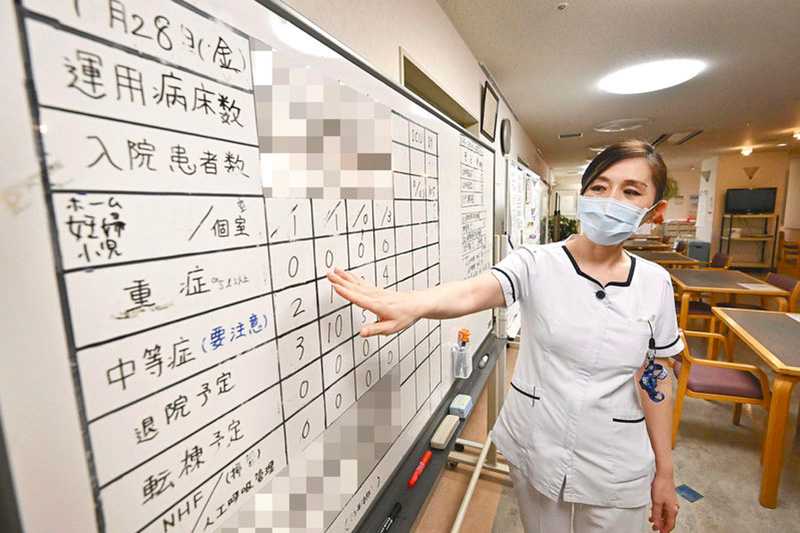
A nurse indicates a line on a whiteboard showing there are no seriously ill COVID-19 patients at Ebara Hospital in Ota Ward, Tokyo, on Friday. The photo has been partially modified.
16:14 JST, February 1, 2022
Many hospital beds secured for COVID-19 patients are being occupied by infected elderly patients. In Tokyo, more than half the patients using the beds are at least 60 years old.
In many cases, the elderly need to be hospitalized in case of sudden changes in their condition even if the symptoms are mild.
Frontline medical staff are facing unexpected situations in which patients might need nursing care on top of medical care.
Nursing care needed
On Friday evening at Ebara Hospital in Ota Ward, Tokyo, a medical worker jotted down on a whiteboard “Hospitalized: 105.” The figure was around 30 about 10 days ago but then rapidly increased following the spread of the highly-contagious omicron variant of the novel coronavirus.
More than 100 people were also hospitalized during the fifth wave of infection, with many of them being severely ill young people. This time, however, few patients, even among the elderly, need to be provided with oxygen. The number of seriously ill patients remains at “0” on the whiteboard.
“Unlike the fifth wave, patients who occupy COVID-19 beds now require medical and nursing care,” said Chihiro Taira, the 57-year-old head of the nursing department.
Infected patients with dementia may wander in and out of restricted areas, such as those set up to prevent the spread of infection. During the pre-pandemic era, nurses led such patients by the hand to their room, but currently they avoid touching them. Instead, they call them over with the help of body language. This takes time.
Many COVID-19 patients at Tokyo Joto Hospital in Koto Ward are at least 80 years old, and some of them are categorized in long-term nursing care level 5, the most severe level.
Younger patients can do most things by themselves, such as eating and cleaning up after meals. Patients in need of nursing care might have to be fed by nurses or require help moving about and using the bathroom.
“The labor shortage will become serious if the number of patients in need of nursing care keeps increasing in the future,” said Tokyo Joto Hospital director Atsushi Chuma.
Twice 5th wave’s rate
The Tokyo metropolitan government said 54.6% of hospitalized COVID-19 patients as of Jan. 26 were 60 or older, almost double the 28.6% on Sept. 1, 2021, at the peak of the fifth wave.
Behind the increase is believed to be a decline in the vaccines’ efficacy.
The Cabinet Secretariat’s survey showed nearly 90% of elderly people had received two doses of the vaccine by August last year, helping curb the surge of COVID-19 patients in that age bracket last summer. However, six months have passed since they received their second dose and “the efficacy for the elderly has declined,” according to Shigeru Omi, chairman of the government’s COVID-19 expert panel.
According to the Health, Labor and Welfare Ministry, 112 group infections were reported at elderly facilities nationwide in the week ending Jan. 23, breaking the record of 47 reported amid the fifth wave.
Although omicron-infected patients tend to be less likely to become seriously ill, the situation for elderly people with a preexisting condition can suddenly become worse.
“Hospitals end up admitting elderly people to their COVID-19 beds to be ready for severe illness and to isolate them,” said Hirofumi Nakase, director of Japanese Red Cross Omori Hospital.
To cope with an increasing number of elderly patients, welfare service workers have been dispatched since mid-January to a COVID-19 facility set up by Kanagawa Prefecture. The facility in Kamakura has 109 beds as of Monday and is run by a hospital in the city.
“Medical workers can concentrate on medical care by having nursing care professionals around the beds,” said a person involved in the hospital’s affairs. “It is necessary to share expertise and divide up the roles.”
Top Articles in Society
-

Man Infected with Measles Reportedly Dined at Restaurant in Tokyo Station
-

Man Infected with Measles May Have Come in Contact with Many People in Tokyo, Went to Store, Restaurant Around When Symptoms Emerged
-

Woman with Measles Visited Hospital in Tokyo Multiple Times Before Being Diagnosed with Disease
-

Australian Woman Dies After Mishap on Ski Lift in Nagano Prefecture
-

Foreign Snowboarder in Serious Condition After Hanging in Midair from Chairlift in Nagano Prefecture
JN ACCESS RANKING
-

Japan PM Takaichi’s Cabinet Resigns en Masse
-

Japan Institute to Use Domestic Commercial Optical Lattice Clock to Set Japan Standard Time
-

Israeli Ambassador to Japan Speaks about Japan’s Role in the Reconstruction of Gaza
-

Man Infected with Measles Reportedly Dined at Restaurant in Tokyo Station
-

Videos Plagiarized, Reposted with False Subtitles Claiming ‘Ryukyu Belongs to China’; Anti-China False Information Also Posted in Japan





















